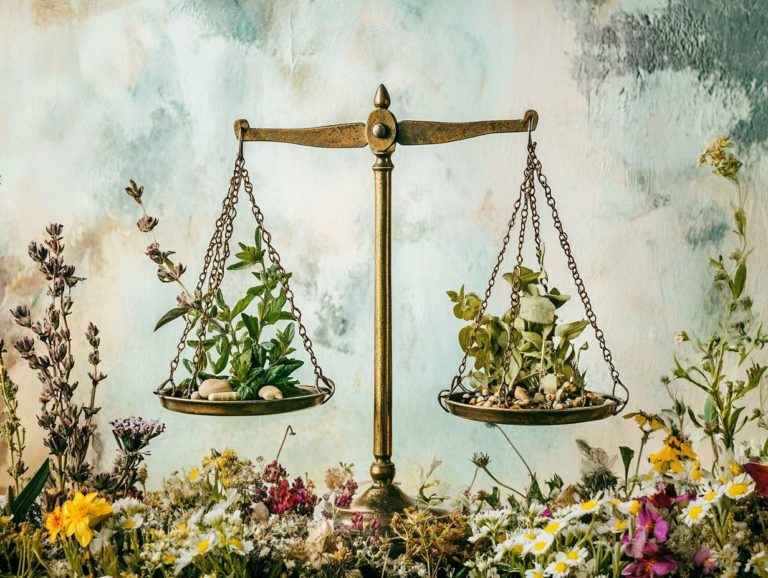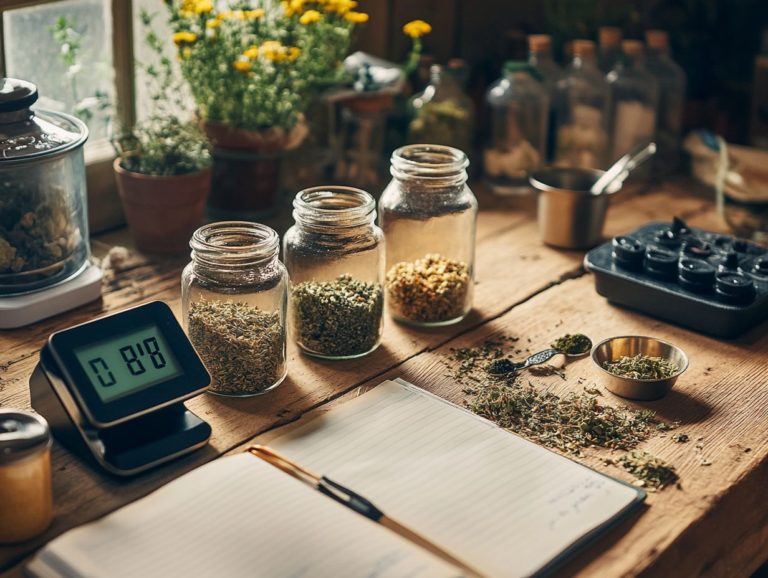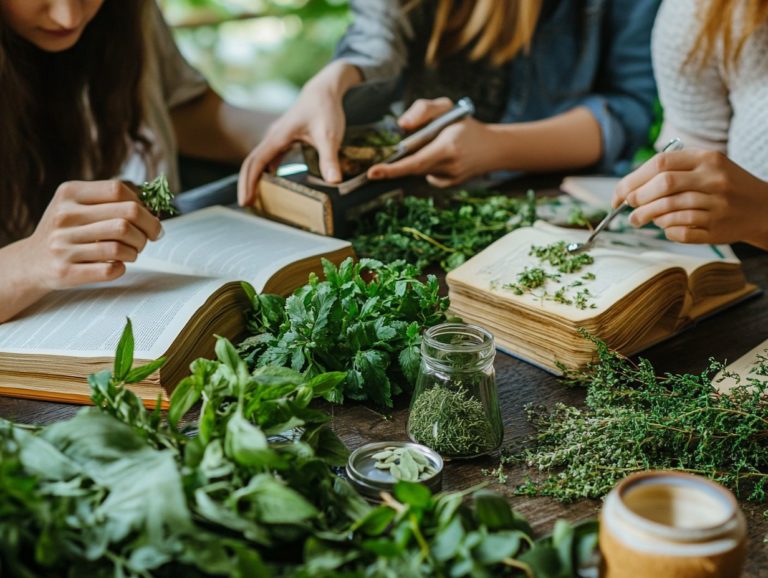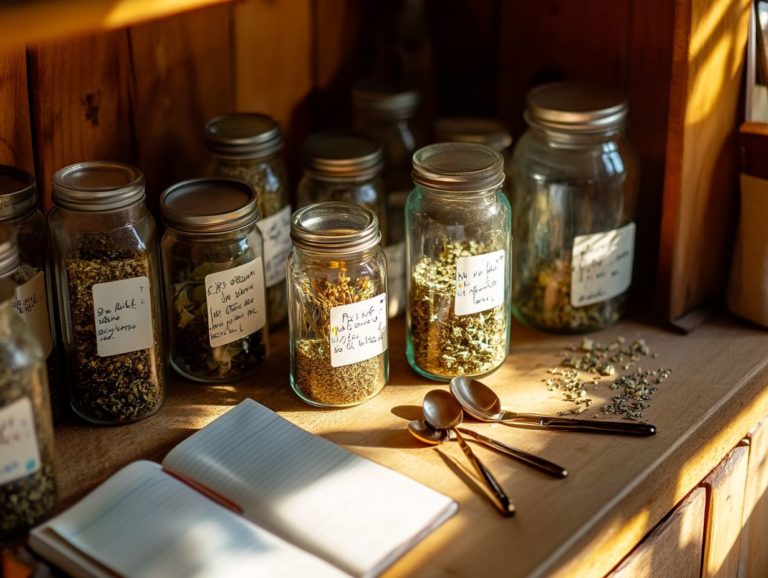The Risks of Self-Medicating with Herbal Dosages
Self-medicating with herbal remedies, especially those classified as herbal medicines, might seem like a natural and tempting fix for various ailments. However, you need to recognize the potential dangers lurking in this practice that many tend to overlook.
This article delves into the risks associated with self-treatment, underscoring the importance of understanding proper herbal dosages and potential interactions with other medications. This is particularly concerning for serious health conditions and safety concerns. It also highlights safer alternatives, emphasizing the value of consulting healthcare professionals to ensure that you are using these remedies effectively and safely.
Join us as you navigate the complexities of herbal self-care, keeping in mind the quality standards and the importance of primary care in your health decisions.
Contents
- Key Takeaways:
- The Dangers of Self-Medicating
- Herbal Dosages and Their Effects
- Interactions with Other Medications
- Alternative Options for Herbal Remedies
- How to Properly Use Herbal Dosages
- Frequently Asked Questions
- What are the risks of self-medicating with herbal dosages?
- How can self-medicating with herbal dosages affect my health?
- Are all herbal supplements safe to self-medicate with?
- Can self-medicating with herbal dosages lead to overdose, especially involving substances like alcohol or opioids?
- Why is it important to consult with a healthcare professional before self-medicating with herbal dosages, particularly for pregnant women?
- What should I do if I experience any negative side effects from self-medicating with herbal dosages, including concerns related to traditional herbal registration?
Key Takeaways:
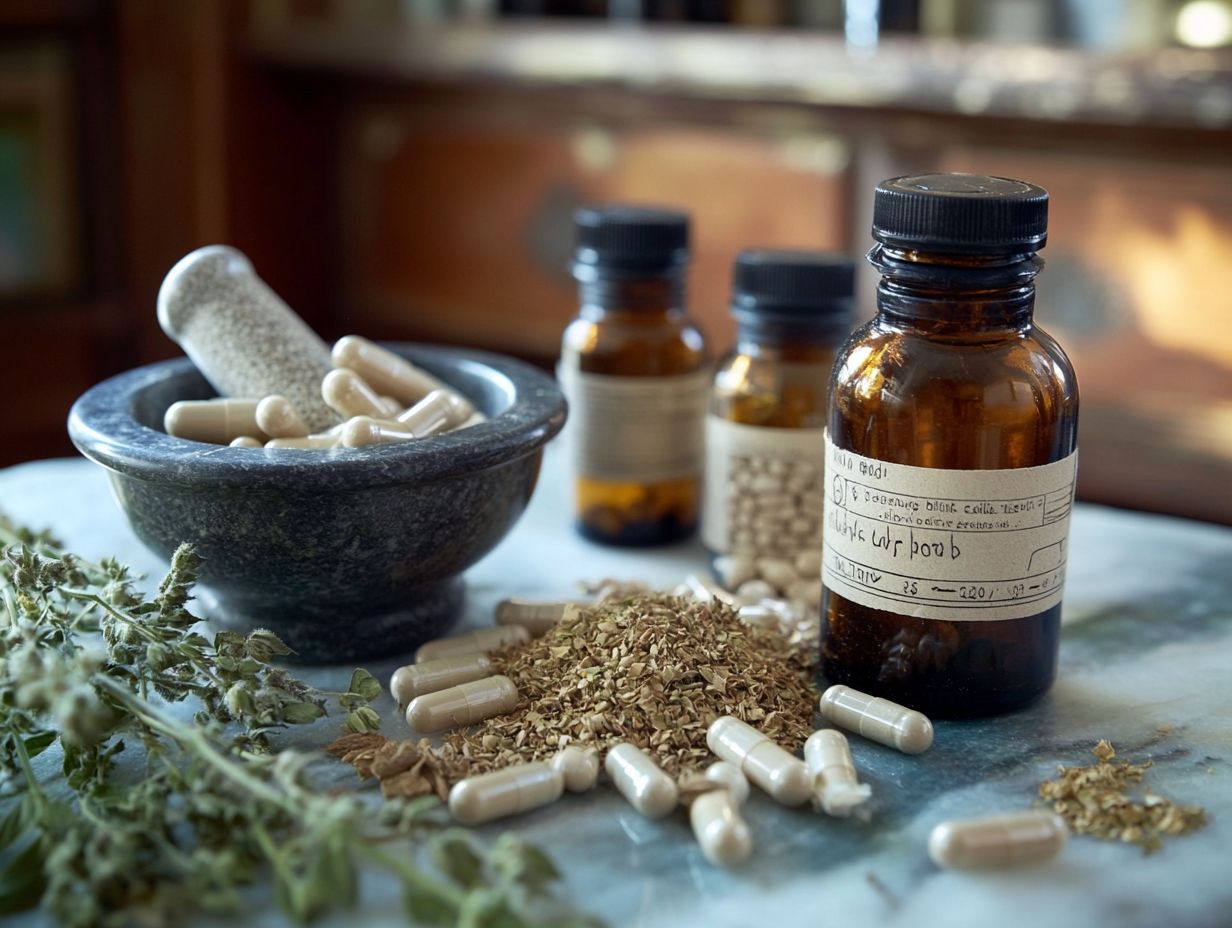
- Self-medicating with herbal dosages carries significant risks, including potential interactions with other medications and improper dosing.
- It’s important to consult with a healthcare professional before using herbal remedies and to follow proper dosing guidelines for safe and effective use.
- Alternative options for herbal remedies, such as seeking advice from a healthcare professional, can help mitigate the risks of self-treatment.
The Dangers of Self-Medicating
Self-treatment, especially when it involves herbal remedies and the use of various plant parts, carries considerable risks due to the absence of professional healthcare oversight. While exploring herbal options as natural alternatives to traditional medicines might be tempting, you need to recognize that self-medication can lead to serious health issues, negative side effects, and safety concerns particularly for vulnerable groups such as pregnant women.
It’s vital to understand that herbal medicines, despite their natural appeal, can interact negatively with prescription medications and worsen existing health conditions. This underscores the necessity of consulting with a healthcare professional before embarking on any self-treatment journey, especially if you have a history of substance use or are managing mental health conditions. Additionally, understanding the role of body weight in herbal dosage can also be crucial for safe usage.
Understanding the Risks
Understanding the risks associated with self-treatment is essential. You might unwittingly engage in harmful practices that could lead to severe consequences, especially with substances like alcohol, opioids, and marijuana. This is particularly true when combining herbal remedies with these substances.
Take St. John’s Wort, for example. Many people turn to it for relief from depression or PTSD, but it can significantly diminish the effectiveness of medications such as selective serotonin reuptake inhibitors (SSRIs), possibly leading to serious conditions like serotonin syndrome, which is a serious condition that can occur when there s too much serotonin in the brain.
Then there’s kava, celebrated for its calming effects; however, it can dangerously interact with benzodiazepines, intensifying sedation and potentially causing respiratory depression. To ensure safety, it’s important to consider dosage recommendations for popular herbs.
If you’re seeking relief from anxiety, depression, or other mental health conditions, be aware that you’re not just at risk from these direct interactions. You might also inadvertently exacerbate existing substance use issues, putting your mental wellness and overall health in jeopardy. To ensure safe usage, consider consulting resources on herbal supplements and recommended dosages.
Herbal Dosages and Their Effects
Herbal dosages are crucial in determining the effectiveness and safety of herbal medicines. The active ingredients extracted from different parts of plants can vary significantly, influencing both their therapeutic benefits and potential side effects.
Careful consideration of these dosages ensures that you achieve the desired results while minimizing any risks associated with herbal remedies and potential adverse reactions. For more detailed information, refer to this guide on herbal remedies: safe dosage for adults and children.
Unlocking the Power of Common Herbs: Dosage Insights
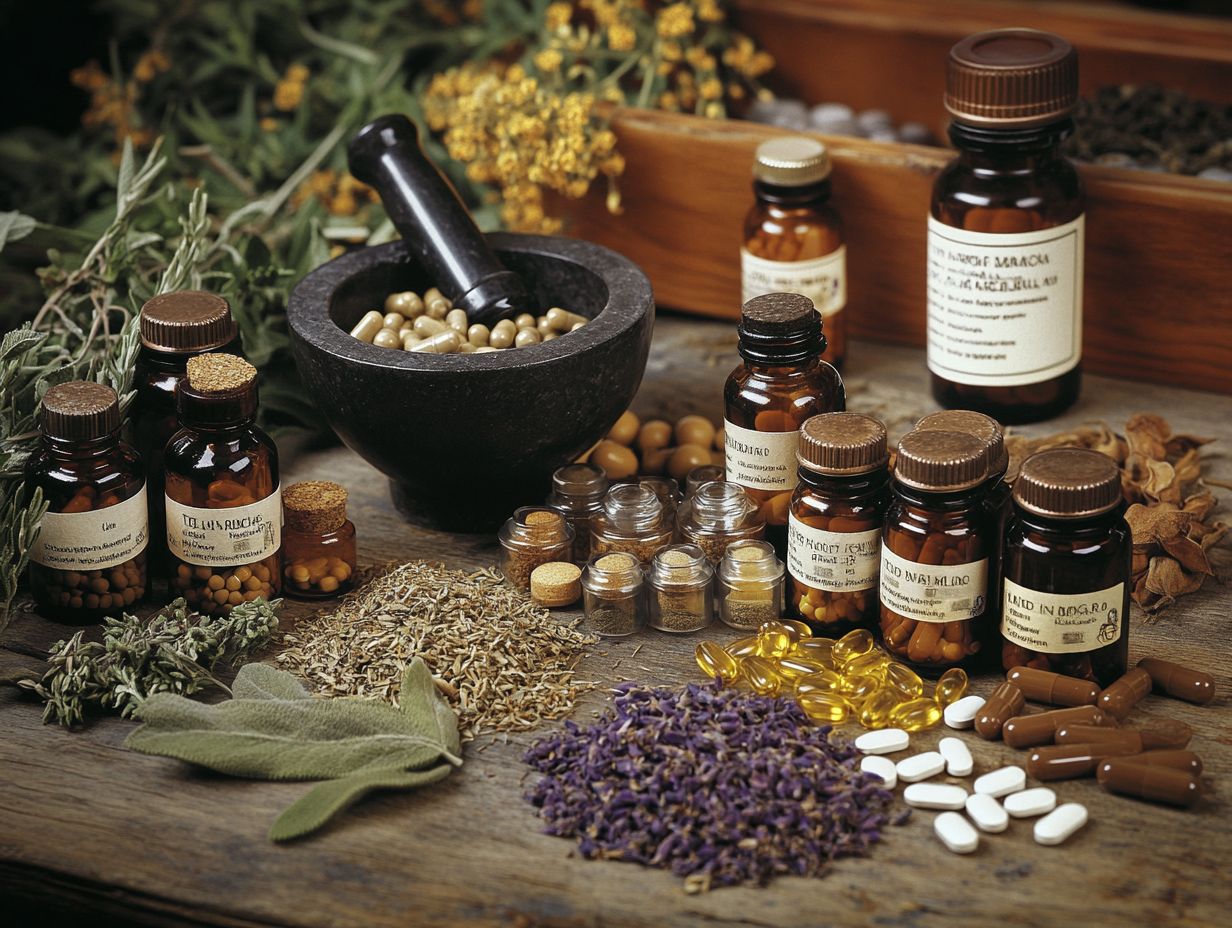
Commonly used herbs, such as St. John s wort, have specific dosages that significantly impact their effectiveness in treating anxiety, depression, and ADHD.
Understanding these dosages is essential. Improper usage can lead to reduced benefits or negative side effects. Many practitioners recommend taking 300 to 900 mg of St. John s wort daily, divided into several doses for optimal results.
Consider other popular options that meet quality standards:
- Valerian root, which aids in sleep disorders, typically suggests dosages from 300 to 600 mg taken before bedtime.
- Ginger, celebrated for digestive benefits, with a daily intake of 1 to 3 grams often advised.
By following evidence-based dosage guidelines and adhering to traditional herbal practices, you can safely tap into these herbs’ therapeutic potential, seamlessly integrating natural treatments into your wellness journey.
Interactions with Other Medications
Interactions between herbal medicines and other medications present significant safety concerns, especially regarding drug interactions that could complicate recovery from surgeries or other medical treatments. These interactions can lead to adverse reactions that jeopardize health.
Stay vigilant to protect your health! It is essential to be informed about potential risks for those under your care.
Potential Consequences and How to Avoid Them
Ignoring drug interactions and safety concerns can lead to serious consequences, complicating treatment plans and affecting overall health, particularly in self-medication.
To minimize these risks, have open conversations with your healthcare provider about any herbal treatments you’re considering or currently using. This dialogue is crucial, especially concerning mental health and substance use issues.
Sharing accurate information helps your healthcare professionals create safer, more effective treatment strategies that consider all substances involved, ensuring that your safety and well-being remain top priorities. Thorough research on potential herb-drug interactions empowers you to make informed health choices, and understanding herbal safety is crucial in this process.
Alternative Options for Herbal Remedies
Exploring alternative options for herbal remedies allows you to access safe and effective treatments that meet high-quality standards, addressing various health conditions, including those requiring careful management like liver disease or kidney disease. Guided by healthcare professionals, these remedies can be an exciting addition to your wellness journey.
Consulting with a Healthcare Professional
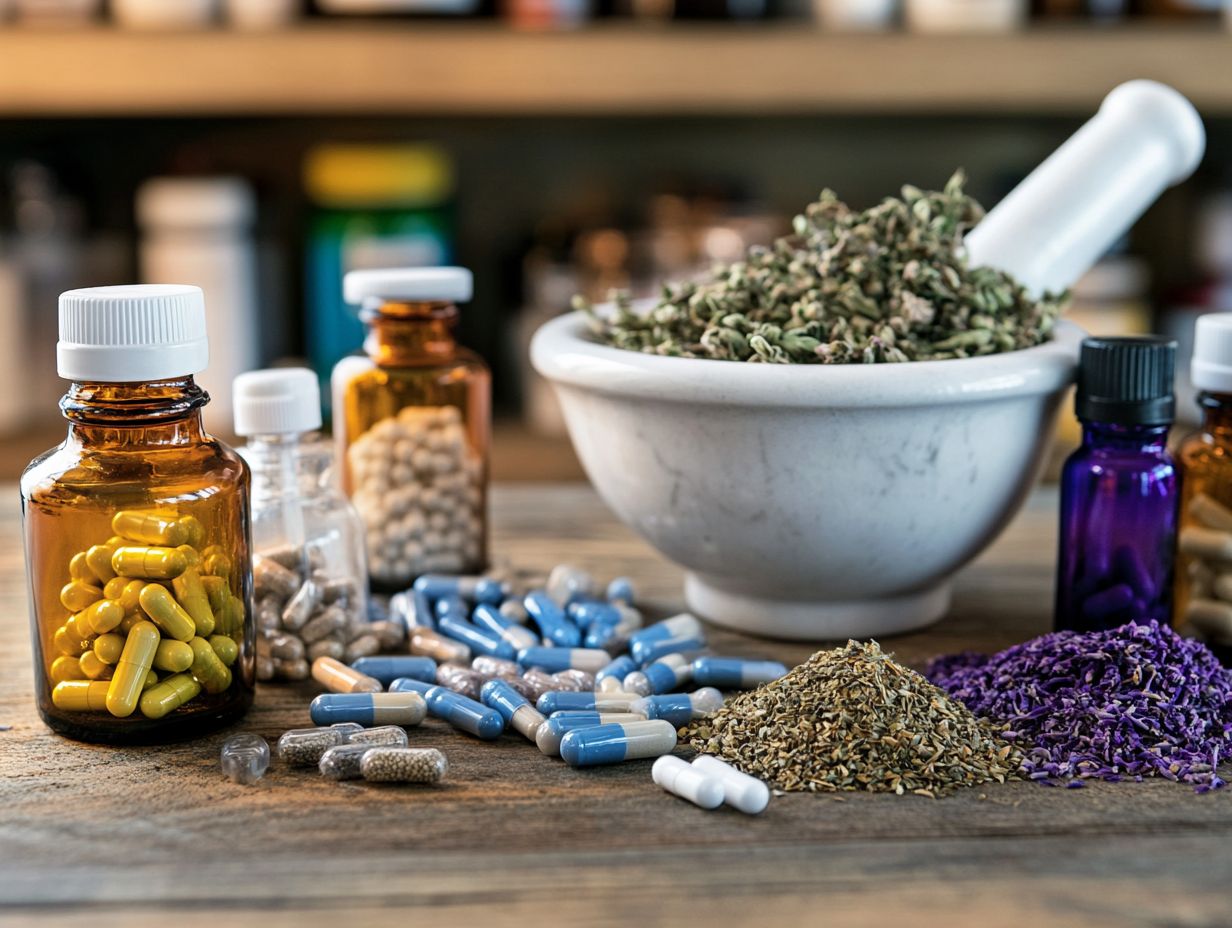
Consulting with a healthcare professional is crucial for the safe and effective use of herbal medicines, especially regarding potential interactions with prescription medications.
These experts provide invaluable insights into which herbal remedies may benefit you, considering your individual health conditions like substance use and mental health. They can also help identify possible side effects and situations where a treatment shouldn’t be used, emphasizing the importance of safety in herbal medicine, shielding you from unforeseen complications.
By combining evidence-based knowledge with your personal health history, healthcare providers enable you to make informed choices about herbal treatments. This approach enhances your understanding of how natural therapies can complement conventional medicine, ensuring that your use of herbal medicines aligns with proper health management practices, including adherence to the Yellow Card Scheme as outlined by GOV.UK. For accurate usage, it’s also important to learn how to measure herbal dosages correctly.
Don t hesitate to reach out to your healthcare provider for guidance!
How to Properly Use Herbal Dosages
Using the correct herbal dosages is crucial for enhancing the effectiveness of your treatment and reducing safety risks associated with the active ingredients in herbal medicines.
Best Practices for Safe and Effective Use
Implementing best practices for safe and effective use is essential for anyone looking to benefit from herbal medicines while minimizing potential risks.
To ensure a positive experience, prioritize the quality of the herbal products you choose. Source them from reputable suppliers who are transparent about their cultivation and processing methods. By following dosage guidelines, you enhance the effectiveness of the herbs and reduce the risk of adverse reactions.
Engage in open conversations with healthcare professionals before adding any herbal treatments to your routine. This collaborative approach ensures safety and allows for personalized recommendations tailored to your unique health needs.
By doing so, you create a more effective treatment strategy that truly works for you.
Frequently Asked Questions
What are the risks of self-medicating with herbal dosages?
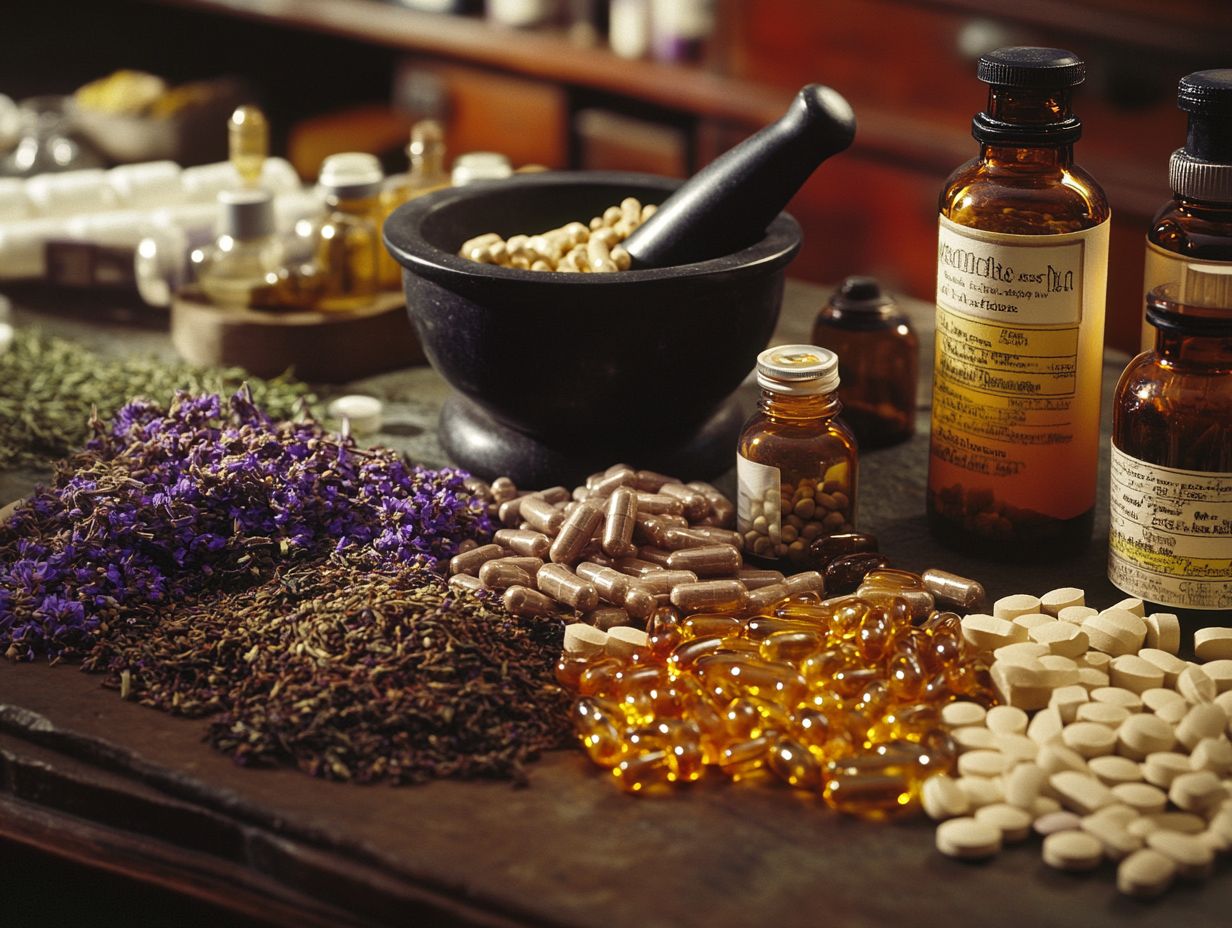
Self-medicating with herbal dosages can be risky, especially due to the lack of regulation in the herbal supplement industry. Inconsistent dosages and potential safety hazards are major concerns.
How can self-medicating with herbal dosages affect my health?
Self-medicating can negatively impact your health. Some herbal supplements may interact with prescription medications, leading to adverse reactions, particularly for individuals with pre-existing conditions like liver disease or those undergoing surgery. Side effects can also include nausea, stomach upset, and allergic reactions.
Are all herbal supplements safe to self-medicate with?
No, not all herbal supplements are safe for self-medication. Some may be toxic or have harmful interactions with medications. Always consult with a healthcare professional before taking any herbal supplement, especially if you have pre-existing health conditions or are on other medications.
Can self-medicating with herbal dosages lead to overdose, especially involving substances like alcohol or opioids?
Yes, self-medicating with herbal dosages can lead to overdose. Herbal supplements can be harmful if taken in excessive amounts. Always follow recommended dosages and never exceed the advised amount.
Why is it important to consult with a healthcare professional before self-medicating with herbal dosages, particularly for pregnant women?
Consulting a healthcare professional before self-medicating is crucial for safety. They can determine if the supplement is suitable for you and check for interactions with existing medications. They also provide guidance on proper dosages and monitor for potential side effects.
If you experience negative side effects, stop taking the supplement and consult with a healthcare professional. They can assess your situation and provide appropriate treatment if necessary.

